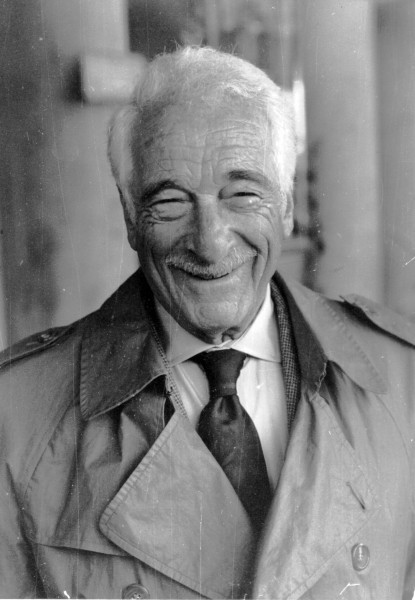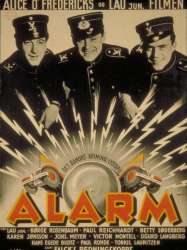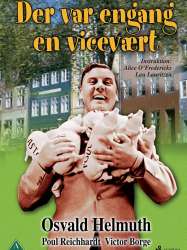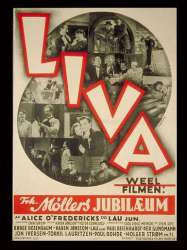Victor Borge is a Actor Danois born on 3 january 1909 at Copenhagen (Danemark)

Børge Rosenbaum (/ˈbɔrɡə/ BOR-gə; 3 January 1909 – 23 December 2000), known professionally as Victor Borge, was a Danish comedian, conductor and pianist who achieved great popularity in radio and television in the United States and Europe. His blend of music and comedy earned him the nickname "The Clown Prince of Denmark", "The Unmelancholy Dane", and "The Great Dane".
Rosenbaum was born in Copenhagen, Denmark, into a Jewish family. His parents, Bernhard and Frederikke (Lichtinger) Rosenbaum, were both musicians—his father a violist in the Royal Danish Orchestra and his mother a pianist. Like his mother, Borge began piano lessons at the age of two, and it was soon apparent that he was a prodigy. He gave his first piano recital when he was eight years old, and in 1918 was awarded a full scholarship at the Royal Danish Academy of Music, studying under Olivo Krause. Later on, he was taught by Victor Schiøler, Liszt's student Frederic Lamond, and Busoni's pupil Egon Petri.
Borge played his first major concert in 1926 at the Danish concert-hall Odd Fellow Palæet (The Odd Fellow's Lodge building). After a few years as a classical concert pianist, he started his now famous "stand up" act, with the signature blend of piano music and jokes. He married American Elsie Chilton in 1933, the same year he debuted with his revue acts. Borge started touring extensively in Europe, where he began telling anti-Nazi jokes.
When the Nazis occupied Denmark during World War II, Borge was playing a concert in Sweden, and managed to escape to Finland. He traveled to America on the United States Army transport American Legion, the last neutral ship to make it out of Petsamo, Finland, and arrived 28 August 1940, with only $20 (about $337 today), with $3 going to the customs fee. Disguised as a sailor, Borge returned to Denmark once during the occupation to visit his dying mother.
Move to America
Even though Borge did not speak a word of English upon arrival, he quickly managed to adapt his jokes to the American audience, learning English by watching movies. He took the name of Victor Borge, and, in 1941, he started on Rudy Vallee's radio show, but was hired soon after by Bing Crosby for his Kraft Music Hall program.
From then on, fame rose quickly for Borge, who won Best New Radio Performer of the Year in 1942. Soon after the award, he was offered film roles with stars such as Frank Sinatra (in Higher and Higher). While hosting The Victor Borge Show on NBC beginning in 1946, he developed many of his trademarks, including repeatedly announcing his intent to play a piece but getting "distracted" by something or other, making comments about the audience, or discussing the usefulness of Chopin's "Minute Waltz" as an egg timer. He would also start out with some well-known classical piece like Beethoven's "Moonlight Sonata" and suddenly move into a harmonically suitable pop or jazz tune like Cole Porter's "Night and Day" or "Happy Birthday to You".
Borge's style
Among Borge's other famous routines is the "Phonetic Punctuation" routine, in which he recites a story, with full punctuation (comma, period, exclamation mark, etc.) as exaggerated onomatopoeic sounds. Another is his "Inflationary Language", where he incremented numbers embedded in words, whether they are visible or not ("once upon a time" becomes "twice upon a time", "wonderful" becomes "twoderful", "forehead" becomes "fivehead", "tennis" becomes "elevennis", "I ate a tenderloin with my fork and so on and so forth" becomes "'I nine an elevenderloin with my five'k' and so on and so fifth").
Borge used physical and visual elements in his live and televised performances. He would play a strange-sounding piano tune from sheet music, looking increasingly confused; turning the sheet upside down or sideways, he would then play the actual tune, flashing a joyful smile of accomplishment to the audience (he had, at first, been literally playing the actual tune upside down or sideways). When his energetic playing of another song would cause him to fall off the piano bench, he would open the seat lid, take out the two ends of an automotive seat belt, and buckle himself onto the bench, "for safety." Conducting an orchestra, he might stop and order a violinist who had played a sour note to get off the stage, then resume the performance and have the other members of the section move up to fill the empty seat while they were still playing. From off stage would come the sound of a gunshot. His musical sidekick in the 1950s, Leonid Hambro, was a well-known concert pianist. In 1968, classical pianist Şahan Arzruni joined him as his straight man, performing together on one piano a version of Liszt's Second Hungarian Rhapsody, considered a musical-comedic classic.
He also enjoyed interacting with the audience. Seeing an interested person in the front row, he would ask them, "Do you like good music?" or "Do you care for piano music?" After an affirmative answer, Borge would take a piece of sheet music from his piano and say, "Here is some," and hand it over. After the audience's laughter died down, he would say, "That'll be $1.95" (or whatever the current price might be). He would then ask whether the audience member could read music; if the member said yes, he would ask a higher price. If he got no response from the audience after a joke, he would often add "...when this ovation has died down, of course." The delayed punch line to handing the person the sheet music would come when he would reach the end of a number and begin playing the penultimate notes over and over, with a puzzled look. He would then go back to the person in the audience, retrieve the sheet music, tear off a piece of it, stick it on the piano, and play the last couple of notes from it.
Making fun of modern theater, he would sometimes begin a performance by asking if there were any children in the audience. There always were, of course. He would sternly order them out, then say, "We do have some children in here; that means I can't do the second half in the nude. I'll wear the tie. (pause) The long one. (pause) The very long one, yes."
In his stage shows in later years, he would include a segment with opera singer Marilyn Mulvey. She would try to sing an aria, and he would react and interrupt, with such antics as falling off the bench in "surprise" when she hit a high note. He would also remind her repeatedly not to rest her hand on the piano. After the routine, the spotlight would fall upon Mulvey and she would sing a serious number with Borge accompanying in the background.
Later career
Borge appeared on Toast of the Town hosted by Ed Sullivan several times during 1948. He became a naturalized citizen of the United States the same year. He started the Comedy in Music show at John Golden Theatre in New York City on 2 October 1953. Comedy in Music became the longest running one-man show in the history of theater with 849 performances when it closed on 21 January 1956, a feat which placed it in the Guinness Book of World Records.
Continuing his success with tours and shows, Borge played with and conducted orchestras including the Chicago Symphony Orchestra, the New York Philharmonic and London Philharmonic. Always modest, he felt honored when he was invited to conduct the Royal Danish Orchestra at the Royal Danish Theatre in Copenhagen, Denmark, in 1992.
His later television appearances included his "Phonetic Punctuation" routine on The Electric Company in a filmed sketch; he would also use it on the record to follow during the "Punctuation" song. He appeared several times on Sesame Street and was a guest star during the fourth season of The Muppet Show.
Victor Borge continued to tour until his last days, performing up to 60 times per year when he was 90 years old.
Other endeavors
Borge made several appearances on the long-running TV show What's My Line?, both as a celebrity panelist, and as a contestant with the occupation "poultry farmer"; Starting in the 1950s, as a businessman, Borge raised and popularized Rock Cornish game hens.
Borge helped start several trust funds, including the Thanks to Scandinavia Fund, which was started in dedication to those who helped the Jews escape the German persecution during the war.
Aside from his musical work, Borge wrote three books, My Favorite Intermissions and My Favorite Comedies in Music (both with Robert Sherman), and the autobiography Smilet er den korteste afstand ("The Smile is the Shortest Distance") with Niels-Jørgen Kaiser.
In 1979, Borge founded the American Pianists Association (then called the Beethoven Foundation) with Julius Bloom and Anthony P. Habig. The American Pianists Association now produces two major piano competitions: the Classical Fellowship Awards and the Jazz Fellowship Awards.
Source : Wikidata
Victor Borge

Birth name Børge Rosenbaum
Nationality Danemark
Birth 3 january 1909 at Copenhagen (Danemark)
Death 23 december 2000 (at 91 years) at Greenwich (USA)
Nationality Danemark
Birth 3 january 1909 at Copenhagen (Danemark)
Death 23 december 2000 (at 91 years) at Greenwich (USA)
Biography
Early life and careerRosenbaum was born in Copenhagen, Denmark, into a Jewish family. His parents, Bernhard and Frederikke (Lichtinger) Rosenbaum, were both musicians—his father a violist in the Royal Danish Orchestra and his mother a pianist. Like his mother, Borge began piano lessons at the age of two, and it was soon apparent that he was a prodigy. He gave his first piano recital when he was eight years old, and in 1918 was awarded a full scholarship at the Royal Danish Academy of Music, studying under Olivo Krause. Later on, he was taught by Victor Schiøler, Liszt's student Frederic Lamond, and Busoni's pupil Egon Petri.
Borge played his first major concert in 1926 at the Danish concert-hall Odd Fellow Palæet (The Odd Fellow's Lodge building). After a few years as a classical concert pianist, he started his now famous "stand up" act, with the signature blend of piano music and jokes. He married American Elsie Chilton in 1933, the same year he debuted with his revue acts. Borge started touring extensively in Europe, where he began telling anti-Nazi jokes.
When the Nazis occupied Denmark during World War II, Borge was playing a concert in Sweden, and managed to escape to Finland. He traveled to America on the United States Army transport American Legion, the last neutral ship to make it out of Petsamo, Finland, and arrived 28 August 1940, with only $20 (about $337 today), with $3 going to the customs fee. Disguised as a sailor, Borge returned to Denmark once during the occupation to visit his dying mother.
Move to America
Even though Borge did not speak a word of English upon arrival, he quickly managed to adapt his jokes to the American audience, learning English by watching movies. He took the name of Victor Borge, and, in 1941, he started on Rudy Vallee's radio show, but was hired soon after by Bing Crosby for his Kraft Music Hall program.
From then on, fame rose quickly for Borge, who won Best New Radio Performer of the Year in 1942. Soon after the award, he was offered film roles with stars such as Frank Sinatra (in Higher and Higher). While hosting The Victor Borge Show on NBC beginning in 1946, he developed many of his trademarks, including repeatedly announcing his intent to play a piece but getting "distracted" by something or other, making comments about the audience, or discussing the usefulness of Chopin's "Minute Waltz" as an egg timer. He would also start out with some well-known classical piece like Beethoven's "Moonlight Sonata" and suddenly move into a harmonically suitable pop or jazz tune like Cole Porter's "Night and Day" or "Happy Birthday to You".
Borge's style
Among Borge's other famous routines is the "Phonetic Punctuation" routine, in which he recites a story, with full punctuation (comma, period, exclamation mark, etc.) as exaggerated onomatopoeic sounds. Another is his "Inflationary Language", where he incremented numbers embedded in words, whether they are visible or not ("once upon a time" becomes "twice upon a time", "wonderful" becomes "twoderful", "forehead" becomes "fivehead", "tennis" becomes "elevennis", "I ate a tenderloin with my fork and so on and so forth" becomes "'I nine an elevenderloin with my five'k' and so on and so fifth").
Borge used physical and visual elements in his live and televised performances. He would play a strange-sounding piano tune from sheet music, looking increasingly confused; turning the sheet upside down or sideways, he would then play the actual tune, flashing a joyful smile of accomplishment to the audience (he had, at first, been literally playing the actual tune upside down or sideways). When his energetic playing of another song would cause him to fall off the piano bench, he would open the seat lid, take out the two ends of an automotive seat belt, and buckle himself onto the bench, "for safety." Conducting an orchestra, he might stop and order a violinist who had played a sour note to get off the stage, then resume the performance and have the other members of the section move up to fill the empty seat while they were still playing. From off stage would come the sound of a gunshot. His musical sidekick in the 1950s, Leonid Hambro, was a well-known concert pianist. In 1968, classical pianist Şahan Arzruni joined him as his straight man, performing together on one piano a version of Liszt's Second Hungarian Rhapsody, considered a musical-comedic classic.
He also enjoyed interacting with the audience. Seeing an interested person in the front row, he would ask them, "Do you like good music?" or "Do you care for piano music?" After an affirmative answer, Borge would take a piece of sheet music from his piano and say, "Here is some," and hand it over. After the audience's laughter died down, he would say, "That'll be $1.95" (or whatever the current price might be). He would then ask whether the audience member could read music; if the member said yes, he would ask a higher price. If he got no response from the audience after a joke, he would often add "...when this ovation has died down, of course." The delayed punch line to handing the person the sheet music would come when he would reach the end of a number and begin playing the penultimate notes over and over, with a puzzled look. He would then go back to the person in the audience, retrieve the sheet music, tear off a piece of it, stick it on the piano, and play the last couple of notes from it.
Making fun of modern theater, he would sometimes begin a performance by asking if there were any children in the audience. There always were, of course. He would sternly order them out, then say, "We do have some children in here; that means I can't do the second half in the nude. I'll wear the tie. (pause) The long one. (pause) The very long one, yes."
In his stage shows in later years, he would include a segment with opera singer Marilyn Mulvey. She would try to sing an aria, and he would react and interrupt, with such antics as falling off the bench in "surprise" when she hit a high note. He would also remind her repeatedly not to rest her hand on the piano. After the routine, the spotlight would fall upon Mulvey and she would sing a serious number with Borge accompanying in the background.
Later career
Borge appeared on Toast of the Town hosted by Ed Sullivan several times during 1948. He became a naturalized citizen of the United States the same year. He started the Comedy in Music show at John Golden Theatre in New York City on 2 October 1953. Comedy in Music became the longest running one-man show in the history of theater with 849 performances when it closed on 21 January 1956, a feat which placed it in the Guinness Book of World Records.
Continuing his success with tours and shows, Borge played with and conducted orchestras including the Chicago Symphony Orchestra, the New York Philharmonic and London Philharmonic. Always modest, he felt honored when he was invited to conduct the Royal Danish Orchestra at the Royal Danish Theatre in Copenhagen, Denmark, in 1992.
His later television appearances included his "Phonetic Punctuation" routine on The Electric Company in a filmed sketch; he would also use it on the record to follow during the "Punctuation" song. He appeared several times on Sesame Street and was a guest star during the fourth season of The Muppet Show.
Victor Borge continued to tour until his last days, performing up to 60 times per year when he was 90 years old.
Other endeavors
Borge made several appearances on the long-running TV show What's My Line?, both as a celebrity panelist, and as a contestant with the occupation "poultry farmer"; Starting in the 1950s, as a businessman, Borge raised and popularized Rock Cornish game hens.
Borge helped start several trust funds, including the Thanks to Scandinavia Fund, which was started in dedication to those who helped the Jews escape the German persecution during the war.
Aside from his musical work, Borge wrote three books, My Favorite Intermissions and My Favorite Comedies in Music (both with Robert Sherman), and the autobiography Smilet er den korteste afstand ("The Smile is the Shortest Distance") with Niels-Jørgen Kaiser.
In 1979, Borge founded the American Pianists Association (then called the Beethoven Foundation) with Julius Bloom and Anthony P. Habig. The American Pianists Association now produces two major piano competitions: the Classical Fellowship Awards and the Jazz Fellowship Awards.
Usually with
Filmography of Victor Borge (8 films)
Actor

Mickey's Christmas Carol (1983)
, 26minutesDirected by Burny Mattinson
Origin USA
Genres Comedy-drama, Animation
Themes Films about animals, Christmas films, Time travel films, Films about birds, Mise en scène d'un rongeur, Ghost films, Mise en scène d'un canard, Mise en scène d'une souris, Children's films, Mise en scène d'un mammifère
Actors Alan Young, Wayne Allwine, Clarence Nash, Hal Smith, Ethel Merman, Gene Kelly
Rating79%





Le soir de Noël, l'égoïste et acariâtre Ebenezer Scrooge reçoit la visite du fantôme de son ancien associé, Jacob Marley. Celui-ci tente de le convaincre de l'immoralité de son métier d'usurier. Jacob lui-même, qui « escroquait les veuves et grugeait les pauvres », montre à Ebenezer les lourdes chaînes qu'il est condamné à porter « pour l'éternité… et peut-être même au-delà ». Jacob menace Ebenezer de la damnation s'il ne revient pas à une conduite plus morale.

The King of Comedy (1982)
, 1h45Directed by Martin Scorsese, Todd Phillips
Origin USA
Genres Drama, Thriller, Comedy, Comedy-drama, Crime
Themes Films about television, Children's films
Actors Robert De Niro, Jerry Lewis, Sandra Bernhard, Diahnne Abbott, Shelley Hack, Martin Scorsese
Roles Himself
Rating77%





Rupert Pupkin (De Niro), a stage-door autograph hound, is an aspiring stand-up comedian unsuccessfuly trying to launch his career. After meeting Jerry Langford (Lewis), a successful comedian and talk show host, Rupert believes his "big break" has finally come. He attempts to get a place on the show but is continually rebuffed by Langford's staff and, finally, by Langford himself. Along the way, Rupert indulges in elaborate and obsessive fantasies where he and Langford are colleagues and friends. He even takes a date, Rita, to Langford's home, uninvited, trying to impress her.

The Daydreamer (1966)
, 1h41Directed by Jules Bass
Origin USA
Genres Drama, Science fiction, Fantasy, Adventure, Musical, Animation
Themes Mermaids in film, Musical films, Children's films
Actors Paul O'Keefe, Jack Gilford, Ray Bolger, Margaret Hamilton, Burl Ives, Sessue Hayakawa
Roles Zenith, the Second Tailor (voice)
Rating60%





It is early in the 19th century. The thirteen-year-old Hans Christian Andersen (called "Chris" for short; portrayed and voiced by Paul O'Keefe) is known in his native village of Odense, Denmark, as an incurable daydreamer. Actually, the boy's reveries are an escape from the hardships of his family's life.

Higher and Higher (1943)
, 1h30Directed by Tim Whelan
Origin USA
Genres Comedy, Musical theatre, Musical
Themes Films about music and musicians, Théâtre, Musical films, Films based on plays, Films based on musicals
Actors Michèle Morgan, Jack Haley, Frank Sinatra, Leon Errol, Victor Borge, Barbara Hale
Roles Sir Victor
Rating60%





The household staff of millionaire Cyrus Drake hasn't been paid for months when his bankruptcy is announced. With the wife and daughter of Cyrus on a long trip abroad, a scheme is formed to pass off the attractive young maid Millie as the socialite daughter, Pamela Drake, and marry her off to a rich man so there'll be money for all.

De tre måske fire (1939)
, 1h39Directed by Lau Lauritzen Jr., Alice O'Fredericks
Origin Danemark
Genres Comedy
Actors Victor Borge, Lau Lauritzen Jr., Poul Reichhardt, Per Gundmann, Erika Voigt, Eigil Reimers
Roles Kontorist - Bøjesen
Rating58%






Alarm (1938)
, 1h44Directed by Lau Lauritzen Jr., Alice O'Fredericks
Origin Danemark
Genres Comedy
Actors Lau Lauritzen Jr., Victor Borge, Johannes Meyer, Victor Montell, Karen Jønsson, Poul Reichhardt
Roles Tjener Cæsar
Rating57%






Der var engang en vicevært (1937)
, 1h40Directed by Lau Lauritzen Jr., Alice O'Fredericks
Origin Danemark
Genres Comedy
Themes Children's films
Actors Osvald Helmuth, Victor Borge, Connie Meiling, Sigurd Langberg, Asta Hansen, Poul Reichhardt
Roles Komponist Bøegh
Rating56%






Frk. Møllers jubilæum (1937)
, 1h35Directed by Lau Lauritzen Jr., Alice O'Fredericks
Origin Danemark
Genres Comedy
Actors Liva Weel, Victor Borge, Karen Jønsson, Lau Lauritzen Jr., Poul Reichhardt, Per Gundmann
Rating28%





 Connection
Connection


